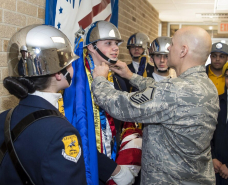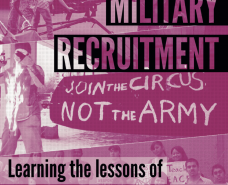War College says Courage to Resist impedes recruiting

Source: http://couragetoresist.org/news/1018-war-college.html
By Mike Mckee, Courage to Resist. March 17, 2014
A recently circulated academic paper from a U.S. Army War College research fellow demonstrates that organizations like Courage to Resist are having a substantive effect on the military’s ability to recruit and retain soldiers.
The paper, titled “Civilian Organizational Inhibitors to US Army Recruiting and the Road Ahead (PDF),” singles out Courage to Resist as a key example of its most formidable opponents that “aim to hinder, deter, or prevent United States Army Recruiters from presenting information and providing opportunities to their target market.”
Writing in 2010, its author, Lt. Col. Todd Jacobus of the US Army National Guard, outlines the opposition faced by the military’s “11,000-strong recruiting force” combing schools, neighborhoods and public areas (including some 3,000 recruiting stations).
“Counter-recruiting groups have many common characteristics, including the perception that they are obliged to inform and educate those who are considering service in our Army,” writes Jacobus. “They use techniques and strategies that frequently depict professional military recruiters in an ill-light, disillusion influencers, and dissuade potential applicants from looking into military service as a viable option … Some actually do a decent job of providing useful information, decision making tools and counsel.”
Alongside a handful of historic veterans and religious groups, Courage to Resist is singled out as the representative of independent and unaffiliated organizations nationally that “have a negative affect on potential Soldiers in our formations, and the centers of influence in our schools, communities, and religious institutions.”
The War College research goes on to identify ways in which Courage to Resist amplifies the voice of veterans and their often emotional testimony; builds support for dissatisfied members of the armed forces; and assists those in active service in securing release from the military through legal assistance, publicity and referrals.
“They also provide political, emotional, and material support to all military objectors critical of our government‘s current policies of empire,” writes Jacobus.
The military, along with the author of this paper, naturally objects to the depiction of recruiters as “vultures who see potential soldiers as a body, a number” and who “have little or no interest in the individual as a person.”
If such public perception doesn’t make their job any easier, the harsh realities of first-hand experience in the armed forces certainly aren’t helping either. The report notes how interviews with veterans and literature from groups such as Courage to Resist, Veterans for Peace and Iraq Veterans Against the War highlight the “negative aspects of service in a combat zone,” namely being trained to kill, deployment to war, and “the destruction of both friends and innocent people” (their words).
The research expresses concern that Courage to Resist and similar organizations challenge potential soldiers to visit hospitals to see those who suffer from the psychological and bodily effects of military service, and that grassroots groups also highlight the increasing trends of domestic abuse, divorce and suicide in army families, noting bluntly, “Many of the issues raised by these counter-recruiting organizations are based on truths.”
When you combine all this with the solid impression that people seem convinced that it’s the poor who are always sent to fight the rich man’s war, the War College paper suggests this is not a good time to be a military recruiter. Popular opinion, says Lt. Col. Jacobus, is that massive swaths of new enlisteds are culled from the nation’s disenfranchised neighborhoods and funneled into a military where they are “not respected, and where they will be asked to do the dirty work for the powerful and influential segment of society.”
We couldn’t say it better ourselves.
What’s more, argues the report, counter-recruitment groups like Courage to Resist draw attention to international news stories such as abuse at Abu Ghraib, the abandonment of returning veterans, the deplorable conditions at Walter Reed Medical Center, civilian casualties and high-profile fatalities like Corporal Pat Tillman, lamenting that all too often “the media is a conduit for the American people into the bowels of the organization.”
Recruiters still have a few cards to play, the report concedes. If much of the American public still stubbornly reflects on all of the above, it might be time to exploit the tragedy of September 11—again.
When confronted with criticism around these highlighted issues—and, especially, the legality of recent wars in Iraq and Afghanistan—recruiters are encouraged to frame their arguments with the worldview that the U.S.A. has been the underdog in consistent terrorist attacks since 1780.
“It is through these lenses that the President of the United States and the United States Congress voted to engage in … the Global War On Terror,” says the report. “Now more than ever our Nation depends on citizens separating themselves from the rest of society by making a commitment to serve in its time of need.” One can hear the crickets chirping in response.
The report concludes with a rallying cry and a plea that the military recruiters should not, can not, must not be silenced—a tell-tale sign of which way the tables have turned.
Simply put, the research of the U.S. Army War College concludes that the public is waking up to what recruiters are pushing.
To give the report the last word, we’ll quote their own findings that demonstrate how Courage to Resist’s messaging is not the opinion of a marginal fringe, but rather, a “school of thought, which is vocalized within the hallways of our high schools, across college campuses, and even around dinner tables in small towns and large cities.”
We couldn’t have done it with out you, dear reader.
Countering Military Recruitment

WRI's new booklet, Countering Military Recruitment: Learning the lessons of counter-recruitment campaigns internationally, is out now. The booklet includes examples of campaigning against youth militarisation across different countries with the contribution of grassroot activists.
You can order a paperback version here.








